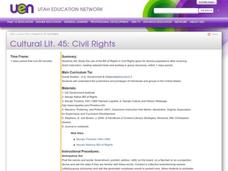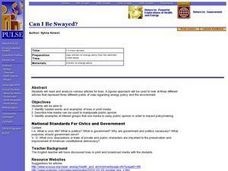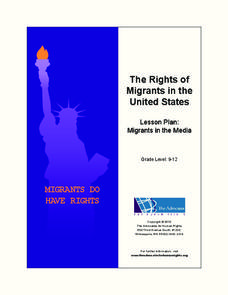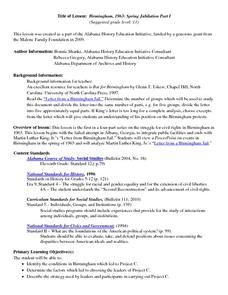Curated OER
I Am Not a Crook
Students use video, Internet research and discussion to consider the presidency of Richard Nixon. They obtain information from multiple perspectives and form an opinion of how Richard Nixon should be remembered.
Curated OER
Separate is Not Equal: Brown v. Board of Education
Students analyze photographs that feature segregation. In this human rights activity, students examine photographs of a segregated movie theater, a Ku Klux Klan gathering, a segregated business sign, and an illustration from "Harper's...
Curated OER
A Time for Justice
Students explain the protections and privileges of individuals and groups in the United States.
Curated OER
Civil Rights
Students are introduced to the concept of Civil Rights. In groups, they use a timeline of the Navajo tribe to identify the ways the tribe has made advances in Civil Rights throughout the years. To end the lesson, they take notes and...
Curated OER
Can I Be Swayed?
Students identify loaded words and examples of bias in print media. They describe how media can be used to manipulate public opinion. Students identify examples of interest groups that use media to sway public opinion in order to impact...
Curated OER
What is an Iron Triangle?
Students discuss how interest groups, congress and the executive branch play a role in policy making to make up the Iron Triangle. They list the three points of the Iron Triangle and explain the role they have on public policy. Students...
Curated OER
Civil Action
Students will observe the legal procedures involved in class action lawsuits and gain knowledge of how they are sometimes used as a tool to deter polluters of the environment. Students will also read about the background the Love Canal...
Curated OER
Is Congress for Sale?
High schoolers research web sites to measure the level of influence campaign donations and Political Action Committees have on their representatives and senators. They discover opportunities for private citizens to lobby elected...
Curated OER
Moot Court Preparation
Twelfth graders prepare themselves for a mock moot court. In groups, they are presented with an overview of each activity and research appellate cases related to the topic given to them. They identify regions of the country that have...
Curated OER
Moot Court
Young scholars research and discuss court cases in preparation for Moot Court. Student attorneys research precedents involving their cases, while student justices research political ideology of Supreme Court Justices. Student attorneys...
Curated OER
Italian Enemy Aliens During World War II: Evacuation from Prohibited Zones
Students read and discuss the Enemy Alien Evacuation Order. They perform research by reading newspaper articles from February 1942 as well as investigating available information on the Internet. Students work in groups to create a...
Curated OER
Electoral Politics
Students formulate their own opinions about the issues in an election campaign through a critical examination of political advertisements, candidate debates, and political cartoons.
John F. Kennedy Presidential Library & Museum
Red States/Blue States: Mapping the Presidential Election
Young historians investigate how voting patterns have changed by comparing the outcome of the 1960 election to the outcome of the recent election. A creative final assessment has participants making a news show wherein they provide...
Advocates for Human Rights
Migrants in the Media
Class members examine two documents—The Universal Declaration of Human Rights and The Rights of Migrants in the United States—and then use reports in the media to assess how well the US is doing in ensuring these rights.
Curated OER
4th Grade Social Studies
In this social studies worksheet, 4th graders answer multiple choice questions about the Bill of Rights, Congress, the National Anthem, and more. Students complete 25 multiple choice questions.
Curated OER
Picture Books and the Bill of Rights
Young scholars identify the basic freedoms of citizens in the United States. In this Bill of Rights lesson, students act out scenarios about the Bill of Rights. Young scholars create a picture book describing the rights...
Alabama Department of Archives and History
Birmingham 1963: Spring Jubilation Part 1
As part of a study of the 1963 quest for civil rights in Birmingham, Alabama, class members view a PowerPoint that details the struggle and analyze Martin Luther King, Jr.'s "Letter from a Birmingham Jail."
Curated OER
All About Groups & Community
Second graders examine the various kinds of groups in our communities and lives. They make charts and drawings of different groups and complete a worksheet imbedded in this plan. The groups are a true cooperative format, with each...
Curated OER
All About Groups And Community
Second graders examine the kinds of rules that different groups have. They work cooperatively in small groups to make rules for different groups and complete a worksheet imbedded in this plan. They have a greater understanding why rules...
Alabama Department of Archives and History
Birmingham, 1963: Spring Jubilation Part 2
The release of Martin Luther King, Jr. from the Birmingham jail, the Children's March, and the bombings of the Gaston Motel and the home of Reverend A.D. King's home. As part of a study of the civil rights movement, class members...
Curated OER
Stamp Act: Virtual Representation vs. Actual Representation
Eleventh graders research and discuss the different points of view of colonists in terms of taxation, as well as how these viewpoints helped lead to the revolution.
Curated OER
It's In Your Pocket
Students examine federal powers. In this U.S. Constitution lesson, students explore the powers of Congress to coin money. Students also study the meaning of the symbols on U.S. coins.
Curated OER
Tango Stories
Students listen to tango music and research the country it came from. In this music lesson plan, students find that tango music comes from Argentina. They listen and dance to the music and then write stories.
Curated OER
All About Groups & Community
Second graders discuss and write in their journals about the roles of leaders in different kinds of groups.























